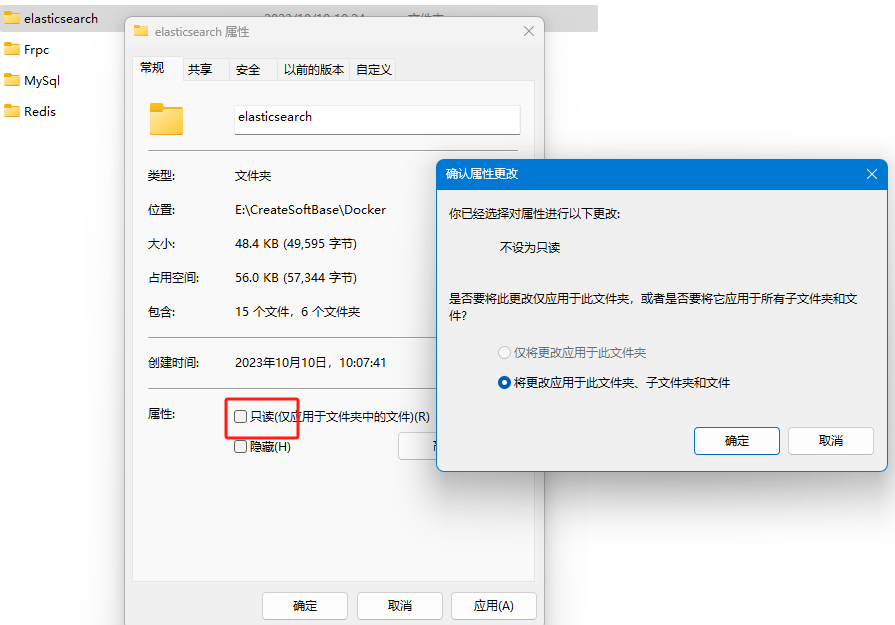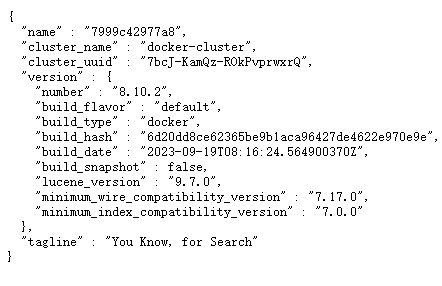安装 Elasticsearch
安装 Elasticsearch
#中间件ElasticSearch#
一、Docker容器
-
创建所需目录和文件
配置:
./config-
elasticsearch.yml
cluster.name: "docker-cluster" http.host: 0.0.0.0----------------------- BEGIN SECURITY AUTO CONFIGURATION -----------------------
The following settings, TLS certificates, and keys have been automatically
generated to configure Elasticsearch security features on 10-10-2023 02:45:44
直接docker创建时,xpack是开的,需要用命令行设置密码后才能访问,在下面我们直接关掉
https://www.elastic.co/guide/en/x-pack/current/security-getting-started.html
--------------------------------------------------------------------------------
Enable security features
xpack.security.enabled: false
xpack.security.enrollment.enabled: false
Enable encryption for HTTP API client connections, such as Kibana, Logstash, and Agents
xpack.security.http.ssl:
enabled: false
keystore.path: certs/http.p12
Enable encryption and mutual authentication between cluster nodes
xpack.security.transport.ssl:
enabled: false
verification_mode: certificate
keystore.path: certs/transport.p12
truststore.path: certs/transport.p12
----------------------- END SECURITY AUTO CONFIGURATION -------------------------
-
jvm.options
################################################################ ## ## JVM configuration ## ################################################################ ## ## WARNING: DO NOT EDIT THIS FILE. If you want to override the ## JVM options in this file, or set any additional options, you ## should create one or more files in the jvm.options.d ## directory containing your adjustments. ## ## See https://www.elastic.co/guide/en/elasticsearch/reference/8.10/jvm-options.html ## for more information. ## ################################################################################################################################
IMPORTANT: JVM heap size
################################################################
The heap size is automatically configured by Elasticsearch
based on the available memory in your system and the roles
each node is configured to fulfill. If specifying heap is
required, it should be done through a file in jvm.options.d,
which should be named with .options suffix, and the min and
max should be set to the same value. For example, to set the
heap to 4 GB, create a new file in the jvm.options.d
directory containing these lines:
-Xms4g
-Xmx4g
See https://www.elastic.co/guide/en/elasticsearch/reference/8.10/heap-size.html
for more information
################################################################
################################################################
Expert settings
################################################################
All settings below here are considered expert settings. Do
not adjust them unless you understand what you are doing. Do
not edit them in this file; instead, create a new file in the
jvm.options.d directory containing your adjustments.
################################################################
-XX:+UseG1GC
JVM temporary directory
-Djava.io.tmpdir=${ES_TMPDIR}
Leverages accelerated vector hardware instructions; removing this may
result in less optimal vector performance
20:--add-modules=jdk.incubator.vector
heap dumps
generate a heap dump when an allocation from the Java heap fails; heap dumps
are created in the working directory of the JVM unless an alternative path is
specified
-XX:+HeapDumpOnOutOfMemoryError
exit right after heap dump on out of memory error
-XX:+ExitOnOutOfMemoryError
specify an alternative path for heap dumps; ensure the directory exists and
has sufficient space
-XX:HeapDumpPath=data
specify an alternative path for JVM fatal error logs
-XX:ErrorFile=logs/hs_err_pid%p.log
GC logging
-Xlog:gc*,gc+age=trace,safepoint:file=logs/gc.log:utctime,level,pid,tags:filecount=32,filesize=64m
-
log4j2.properties
status = error######## Server JSON ############################
appender.rolling.type = Console
appender.rolling.name = rolling
appender.rolling.layout.type = ECSJsonLayout
appender.rolling.layout.dataset = elasticsearch.server################################################
################################################
rootLogger.level = info
rootLogger.appenderRef.rolling.ref = rolling######## Deprecation JSON #######################
appender.deprecation_rolling.type = Console
appender.deprecation_rolling.name = deprecation_rolling
appender.deprecation_rolling.layout.type = ECSJsonLayoutIntentionally follows a different pattern to above
appender.deprecation_rolling.layout.dataset = deprecation.elasticsearch
appender.deprecation_rolling.filter.rate_limit.type = RateLimitingFilterappender.header_warning.type = HeaderWarningAppender
appender.header_warning.name = header_warning
#################################################logger.deprecation.name = org.elasticsearch.deprecation
logger.deprecation.level = WARN
logger.deprecation.appenderRef.deprecation_rolling.ref = deprecation_rolling
logger.deprecation.appenderRef.header_warning.ref = header_warning
logger.deprecation.additivity = false######## Search slowlog JSON ####################
appender.index_search_slowlog_rolling.type = Console
appender.index_search_slowlog_rolling.name = index_search_slowlog_rolling
appender.index_search_slowlog_rolling.layout.type = ECSJsonLayout
appender.index_search_slowlog_rolling.layout.dataset = elasticsearch.index_search_slowlog#################################################
#################################################
logger.index_search_slowlog_rolling.name = index.search.slowlog
logger.index_search_slowlog_rolling.level = trace
logger.index_search_slowlog_rolling.appenderRef.index_search_slowlog_rolling.ref = index_search_slowlog_rolling
logger.index_search_slowlog_rolling.additivity = false######## Indexing slowlog JSON ##################
appender.index_indexing_slowlog_rolling.type = Console
appender.index_indexing_slowlog_rolling.name = index_indexing_slowlog_rolling
appender.index_indexing_slowlog_rolling.layout.type = ECSJsonLayout
appender.index_indexing_slowlog_rolling.layout.dataset = elasticsearch.index_indexing_slowlog#################################################
logger.index_indexing_slowlog.name = index.indexing.slowlog.index
logger.index_indexing_slowlog.level = trace
logger.index_indexing_slowlog.appenderRef.index_indexing_slowlog_rolling.ref = index_indexing_slowlog_rolling
logger.index_indexing_slowlog.additivity = falselogger.org_apache_pdfbox.name = org.apache.pdfbox
logger.org_apache_pdfbox.level = offlogger.org_apache_poi.name = org.apache.poi
logger.org_apache_poi.level = offlogger.org_apache_fontbox.name = org.apache.fontbox
logger.org_apache_fontbox.level = offlogger.org_apache_xmlbeans.name = org.apache.xmlbeans
logger.org_apache_xmlbeans.level = offlogger.com_amazonaws.name = com.amazonaws
logger.com_amazonaws.level = warnlogger.com_amazonaws_jmx_SdkMBeanRegistrySupport.name = com.amazonaws.jmx.SdkMBeanRegistrySupport
logger.com_amazonaws_jmx_SdkMBeanRegistrySupport.level = errorlogger.com_amazonaws_metrics_AwsSdkMetrics.name = com.amazonaws.metrics.AwsSdkMetrics
logger.com_amazonaws_metrics_AwsSdkMetrics.level = errorlogger.com_amazonaws_auth_profile_internal_BasicProfileConfigFileLoader.name = com.amazonaws.auth.profile.internal.BasicProfileConfigFileLoader
logger.com_amazonaws_auth_profile_internal_BasicProfileConfigFileLoader.level = errorlogger.com_amazonaws_services_s3_internal_UseArnRegionResolver.name = com.amazonaws.services.s3.internal.UseArnRegionResolver
logger.com_amazonaws_services_s3_internal_UseArnRegionResolver.level = errorappender.audit_rolling.type = Console
appender.audit_rolling.name = audit_rolling
appender.audit_rolling.layout.type = PatternLayout
appender.audit_rolling.layout.pattern = {
"type":"audit",
"timestamp":"%d{yyyy-MM-dd'T'HH:mm:ss,SSSZ}"
%varsNotEmpty{, "cluster.name":"%enc{%map{cluster.name}}{JSON}"}
%varsNotEmpty{, "cluster.uuid":"%enc{%map{cluster.uuid}}{JSON}"}
%varsNotEmpty{, "node.name":"%enc{%map{node.name}}{JSON}"}
%varsNotEmpty{, "node.id":"%enc{%map{node.id}}{JSON}"}
%varsNotEmpty{, "host.name":"%enc{%map{host.name}}{JSON}"}
%varsNotEmpty{, "host.ip":"%enc{%map{host.ip}}{JSON}"}
%varsNotEmpty{, "event.type":"%enc{%map{event.type}}{JSON}"}
%varsNotEmpty{, "event.action":"%enc{%map{event.action}}{JSON}"}
%varsNotEmpty{, "authentication.type":"%enc{%map{authentication.type}}{JSON}"}
%varsNotEmpty{, "user.name":"%enc{%map{user.name}}{JSON}"}
%varsNotEmpty{, "user.run_by.name":"%enc{%map{user.run_by.name}}{JSON}"}
%varsNotEmpty{, "user.run_as.name":"%enc{%map{user.run_as.name}}{JSON}"}
%varsNotEmpty{, "user.realm":"%enc{%map{user.realm}}{JSON}"}
%varsNotEmpty{, "user.realm_domain":"%enc{%map{user.realm_domain}}{JSON}"}
%varsNotEmpty{, "user.run_by.realm":"%enc{%map{user.run_by.realm}}{JSON}"}
%varsNotEmpty{, "user.run_by.realm_domain":"%enc{%map{user.run_by.realm_domain}}{JSON}"}
%varsNotEmpty{, "user.run_as.realm":"%enc{%map{user.run_as.realm}}{JSON}"}
%varsNotEmpty{, "user.run_as.realm_domain":"%enc{%map{user.run_as.realm_domain}}{JSON}"}
%varsNotEmpty{, "user.roles":%map{user.roles}}
%varsNotEmpty{, "apikey.id":"%enc{%map{apikey.id}}{JSON}"}
%varsNotEmpty{, "apikey.name":"%enc{%map{apikey.name}}{JSON}"}
%varsNotEmpty{, "authentication.token.name":"%enc{%map{authentication.token.name}}{JSON}"}
%varsNotEmpty{, "authentication.token.type":"%enc{%map{authentication.token.type}}{JSON}"}
%varsNotEmpty{, "cross_cluster_access":%map{cross_cluster_access}}
%varsNotEmpty{, "origin.type":"%enc{%map{origin.type}}{JSON}"}
%varsNotEmpty{, "origin.address":"%enc{%map{origin.address}}{JSON}"}
%varsNotEmpty{, "realm":"%enc{%map{realm}}{JSON}"}
%varsNotEmpty{, "realm_domain":"%enc{%map{realm_domain}}{JSON}"}
%varsNotEmpty{, "url.path":"%enc{%map{url.path}}{JSON}"}
%varsNotEmpty{, "url.query":"%enc{%map{url.query}}{JSON}"}
%varsNotEmpty{, "request.method":"%enc{%map{request.method}}{JSON}"}
%varsNotEmpty{, "request.body":"%enc{%map{request.body}}{JSON}"}
%varsNotEmpty{, "request.id":"%enc{%map{request.id}}{JSON}"}
%varsNotEmpty{, "action":"%enc{%map{action}}{JSON}"}
%varsNotEmpty{, "request.name":"%enc{%map{request.name}}{JSON}"}
%varsNotEmpty{, "indices":%map{indices}}
%varsNotEmpty{, "opaque_id":"%enc{%map{opaque_id}}{JSON}"}
%varsNotEmpty{, "trace.id":"%enc{%map{trace.id}}{JSON}"}
%varsNotEmpty{, "x_forwarded_for":"%enc{%map{x_forwarded_for}}{JSON}"}
%varsNotEmpty{, "transport.profile":"%enc{%map{transport.profile}}{JSON}"}
%varsNotEmpty{, "rule":"%enc{%map{rule}}{JSON}"}
%varsNotEmpty{, "put":%map{put}}
%varsNotEmpty{, "delete":%map{delete}}
%varsNotEmpty{, "change":%map{change}}
%varsNotEmpty{, "create":%map{create}}
%varsNotEmpty{, "invalidate":%map{invalidate}}
}%n"node.name" node name from the
elasticsearch.ymlsettings"node.id" node id which should not change between cluster restarts
"host.name" unresolved hostname of the local node
"host.ip" the local bound ip (i.e. the ip listening for connections)
"origin.type" a received REST request is translated into one or more transport requests. This indicates which processing layer generated the event "rest" or "transport" (internal)
"event.action" the name of the audited event, eg. "authentication_failed", "access_granted", "run_as_granted", etc.
"authentication.type" one of "realm", "api_key", "token", "anonymous" or "internal"
"user.name" the subject name as authenticated by a realm
"user.run_by.name" the original authenticated subject name that is impersonating another one.
"user.run_as.name" if this "event.action" is of a run_as type, this is the subject name to be impersonated as.
"user.realm" the name of the realm that authenticated "user.name"
"user.realm_domain" if "user.realm" is under a domain, this is the name of the domain
"user.run_by.realm" the realm name of the impersonating subject ("user.run_by.name")
"user.run_by.realm_domain" if "user.run_by.realm" is under a domain, this is the name of the domain
"user.run_as.realm" if this "event.action" is of a run_as type, this is the realm name the impersonated user is looked up from
"user.run_as.realm_domain" if "user.run_as.realm" is under a domain, this is the name of the domain
"user.roles" the roles array of the user; these are the roles that are granting privileges
"apikey.id" this field is present if and only if the "authentication.type" is "api_key"
"apikey.name" this field is present if and only if the "authentication.type" is "api_key"
"authentication.token.name" this field is present if and only if the authenticating credential is a service account token
"authentication.token.type" this field is present if and only if the authenticating credential is a service account token
"cross_cluster_access" this field is present if and only if the associated authentication occurred cross cluster
"event.type" informs about what internal system generated the event; possible values are "rest", "transport", "ip_filter" and "security_config_change"
"origin.address" the remote address and port of the first network hop, i.e. a REST proxy or another cluster node
"realm" name of a realm that has generated an "authentication_failed" or an "authentication_successful"; the subject is not yet authenticated
"realm_domain" if "realm" is under a domain, this is the name of the domain
"url.path" the URI component between the port and the query string; it is percent (URL) encoded
"url.query" the URI component after the path and before the fragment; it is percent (URL) encoded
"request.method" the method of the HTTP request, i.e. one of GET, POST, PUT, DELETE, OPTIONS, HEAD, PATCH, TRACE, CONNECT
"request.body" the content of the request body entity, JSON escaped
"request.id" a synthetic identifier for the incoming request, this is unique per incoming request, and consistent across all audit events generated by that request
"action" an action is the most granular operation that is authorized and this identifies it in a namespaced way (internal)
"request.name" if the event is in connection to a transport message this is the name of the request class, similar to how rest requests are identified by the url path (internal)
"indices" the array of indices that the "action" is acting upon
"opaque_id" opaque value conveyed by the "X-Opaque-Id" request header
"trace_id" an identifier conveyed by the part of "traceparent" request header
"x_forwarded_for" the addresses from the "X-Forwarded-For" request header, as a verbatim string value (not an array)
"transport.profile" name of the transport profile in case this is a "connection_granted" or "connection_denied" event
"rule" name of the applied rule if the "origin.type" is "ip_filter"
the "put", "delete", "change", "create", "invalidate" fields are only present
when the "event.type" is "security_config_change" and contain the security config change (as an object) taking effect
logger.xpack_security_audit_logfile.name = org.elasticsearch.xpack.security.audit.logfile.LoggingAuditTrail
logger.xpack_security_audit_logfile.level = info
logger.xpack_security_audit_logfile.appenderRef.audit_rolling.ref = audit_rolling
logger.xpack_security_audit_logfile.additivity = falselogger.xmlsig.name = org.apache.xml.security.signature.XMLSignature
logger.xmlsig.level = error
logger.samlxml_decrypt.name = org.opensaml.xmlsec.encryption.support.Decrypter
logger.samlxml_decrypt.level = fatal
logger.saml2_decrypt.name = org.opensaml.saml.saml2.encryption.Decrypter
logger.saml2_decrypt.level = fatal
数据:
./data插件:
./plugins日志:
./logs -
-
设置文件夹权限
linux:
chmod -R 777 config logs pluginswindows:
取消“只读”勾选

-
启动服务
docker run --name elasticsearch -p 9200:9200 -p 9300:9300 -e "discovery.type=single-node" -v E:\CreateSoftBase\Docker\elasticsearch\config:/usr/share/elasticsearch/config/ -v E:\CreateSoftBase\Docker\elasticsearch\data:/usr/share/elasticsearch/data -v E:\CreateSoftBase\Docker\elasticsearch\logs:/usr/share/elasticsearch/logs -v E:\CreateSoftBase\Docker\elasticsearch\plugins:/usr/share/elasticsearch/plugins -d elasticsearch:8.10.2 -
验证
访问http://localhost:9200/,出现以下结果代表成功



 浙公网安备 33010602011771号
浙公网安备 33010602011771号